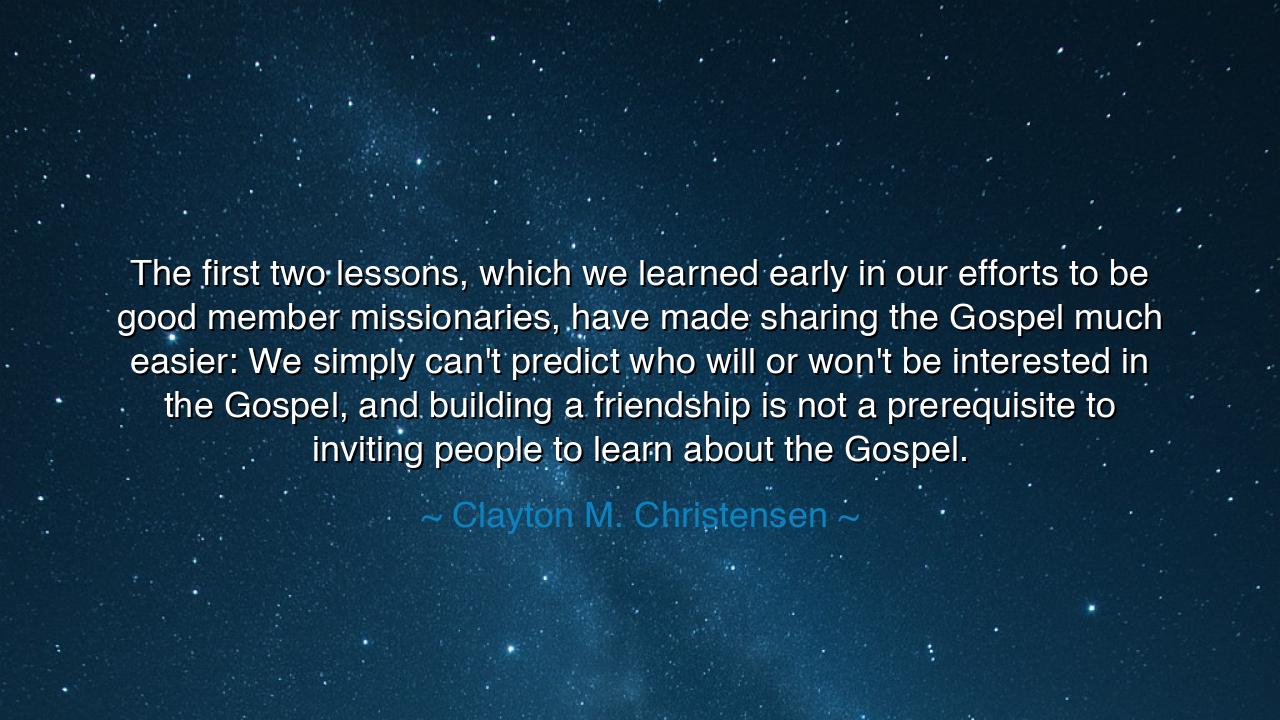
The first two lessons, which we learned early in our efforts to
The first two lessons, which we learned early in our efforts to be good member missionaries, have made sharing the Gospel much easier: We simply can't predict who will or won't be interested in the Gospel, and building a friendship is not a prerequisite to inviting people to learn about the Gospel.






In his reflection on faith and outreach, Clayton M. Christensen — the renowned scholar and devoted believer — offers a truth both humbling and liberating: “We simply can’t predict who will or won’t be interested in the Gospel, and building a friendship is not a prerequisite to inviting people to learn about the Gospel.” These words carry the calm authority of one who has lived their truth. Beneath their simplicity lies a profound teaching about humility, courage, and the mysterious workings of grace. They remind us that divine influence often flows where human reason cannot foresee, and that our duty is not to calculate outcomes, but to act in love and faith.
The origin of this quote rests in Christensen’s personal journey as a member missionary within The Church of Jesus Christ of Latter-day Saints. Known primarily as a Harvard professor and the father of the theory of “disruptive innovation,” he also wrote deeply about spiritual life and moral responsibility. When he and his family sought to share their faith with others, they discovered that human assumptions — about who would listen, who would care, or who would reject them — often proved false. Time and again, hearts opened in unexpected places. The Gospel’s power, he realized, does not depend on human strategy, but on divine timing. Thus came the lesson: never assume, and never withhold truth out of fear or calculation.
There is a timeless echo in his realization — one that recalls the words of Christ Himself, who sowed the seeds of faith among fishermen, tax collectors, and strangers by the roadside. The disciples, too, once wondered who was “worthy” of the message. Yet time revealed that the greatest converts were often those least expected. The human eye sees reputation; the divine heart sees readiness. To wait for the perfect moment, or to build the perfect friendship, is to mistake preparation for permission. As Christensen learned, the call to share truth is universal and immediate — the outcome belongs to heaven.
A parallel can be found in the life of Francis of Assisi, who preached not only to the poor and lepers but even to the Sultan of Egypt during the Crusades. His brothers feared the journey and doubted its purpose — how could a Christian monk, barefoot and frail, expect to be heard by a Muslim ruler in the midst of war? Yet Francis went, not seeking friendship nor fearing rejection, but compelled by compassion. To the astonishment of all, the Sultan welcomed him, listened to him, and they parted in mutual respect. The encounter bore no immediate conversion, but it planted a seed of peace that outlived both men. So it is with the sharing of any sacred truth: our task is to speak, not to predict.
Christensen’s insight into not needing friendship as a prerequisite also speaks to the freedom of love unconditioned. When we require relationship before we share light, we make love a transaction. But the Gospel — and all truth that uplifts the soul — was never meant to be hoarded among friends alone. It is a river meant to flow freely, touching both the known and the stranger. In this, there is courage and humility — to reach beyond comfort, to invite even those we do not know, trusting that the message carries its own power. For faith, like fire, spreads by contact, not calculation.
This teaching also extends beyond religion — into leadership, kindness, and creativity. How often do we judge who might accept our ideas, who might listen to our stories, or who might understand our struggles? We hold back, fearing rejection or misunderstanding. Yet the wisdom of Christensen whispers otherwise: speak, invite, share. For the truth has its own destiny. Every heart carries hidden hunger, every soul its quiet readiness. The messenger’s task is not to measure — it is to give. The rest belongs to grace.
In essence, Christensen’s words call us to trust the unseen workings of faith. The Gospel — or any truth born of love — moves in ways beyond reason. We are merely its carriers, its candles in the night. When we act with sincerity, without precondition or fear, we become part of something larger than persuasion — we become instruments of light. The one who seems indifferent today may be the one who remembers tomorrow.
The lesson, passed down through these words, is clear: Do not wait for certainty before you act. Offer truth freely. Invite without fear. Share without agenda. In practical action, this means living with open hands and open heart — speaking kindly, extending faith, and trusting that goodness will find its way. For in every soul, however unlikely, there dwells the capacity to awaken. And as Clayton Christensen reminds us, the miracle begins not when we predict who will listen, but when we dare to speak — with courage, compassion, and the humility to leave the rest in God’s hands.






AAdministratorAdministrator
Welcome, honored guests. Please leave a comment, we will respond soon